End of the decade: How the 2010s changed my life
- Published
The last decade has seen huge cultural trends, from the way our data is used to how we consume TV and music.
We speak to people about some of the trends of the past decade - and how their lives changed as a consequence.
'I found love on Tinder'
"My life has completely changed because of Tinder," says Alex Bell, from Fareham in Hampshire, who is now expecting a baby with her husband who she met on the app.
Tinder was launched in 2012 on the back of the boom in smartphone use. One of several dating apps, it now has more than 50 million users worldwide.
Neither author Mrs Bell, 33, or her husband are ever reluctant to reveal how they met, but she adds: "Typically people are quite surprised, maybe not quite so much now. It's become more socially acceptable."

"The dating apps were, for me, really convenient time-wise," says fiction author Alex
Although online dating existed before the 2010s, sociology lecturer Dr Róisín Ryan-Flood says: "It used to be that people did it quite furtively and were embarrassed about it, but now it's so ubiquitous."
But while apps may have changed the way we find love, "it's not like it's creating new types of couples," says Dr Ryan-Flood, who is writing a book about online dating.
She says research shows people still go for the same type of person as they conventionally would - despite a bigger pool available.
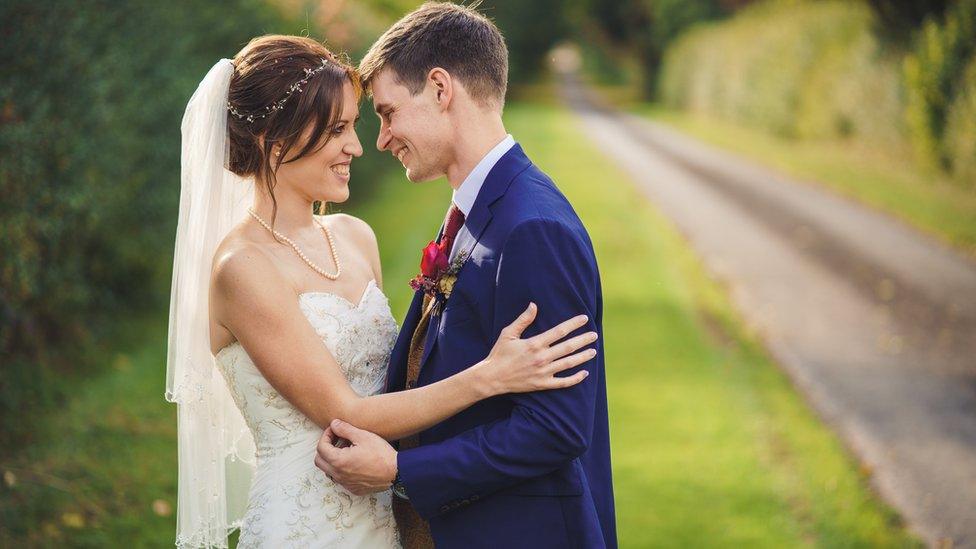
"I wouldn't say it's cool but it's less taboo," says Alex, about couples meeting on dating apps
"People talk a lot about hooking up and dating apps being sent from the devil to destroy marriage and families," adds Dr Julia Carter, also a sociology lecturer.
"But ultimately when you talk to people about what they want, it is the same things."
Dr Carter says fevered coverage of celebrity weddings in the 2010s, such as Prince William and Kate, and Kim Kardashian and Kanye West, shows society still sees marriage as the "gold standard of coupling".
This is despite the UK's marriage rate continuing to fall., external Dr Carter says being alone has also become more acceptable in the past 10 years.
'I made millions on cryptocurrency'
In 2010, the price of one Bitcoin was less than $1. Seven years later, its value briefly reached an all-time high of more than $19,000. Now, the price is around $7,000 (£5,488).
For those who invested and clued-up on Bitcoin and other cryptocurrencies early, the decade was a time like no other.
"I remember thinking it was a really interesting concept," says Erica Stanford, 32, who lives in London.
She first heard about cryptocurrency on the radio in 2009, while studying a masters in economics ("It didn't help at all") - but didn't invest until several years later after speaking about it with a friend.
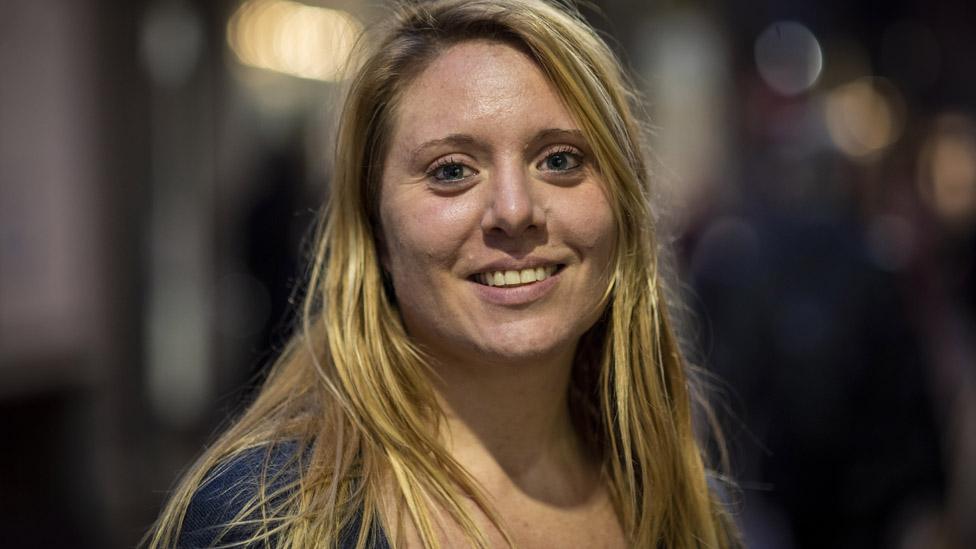
Bitcoin is incredibly secure, says crypto expert Erica. "You can't hack bitcoin, there's not enough computing energy in the world"
"There was lots of these different cryptocurrencies at the time. There were about 500, now there are about 2,500. I worked into an Excel spreadsheet and started researching every one.
"I put in £200 and just played with it, and sent transactions worth 20 quid," she says. "Initially I was just playing."
Ms Stanford and her friend went on to make £20m together. She now runs Crypto Curry Club, which organises networking events for those involved in cryptocurrency.
"I was really lucky enough to get in early enough to do all the geeking before most people had heard of it. More people are now talking or hearing about it and learning about it. It's shaking up a lot of traditional payments."
'I've changed how I do my job'
My workload "certainly hasn't reduced", jokes Mike Ward, TV critic for the Daily Express and Daily Star.
At the start of the decade, people mostly still viewed TV at the same time - with on-demand services like BBC iPlayer still fairly new.
That all began to change in 2012 with the launch of Netflix, and later rivals including Apple TV and Amazon Prime.
Mr Ward says it's important for TV critics now to "see the role as a way to help people" by "steering" them towards the best content.
"I think it's much better and much more constructive to say 'there's a whole lot of stuff I have been privileged to be given access to it, I will do my best to sift through it'."
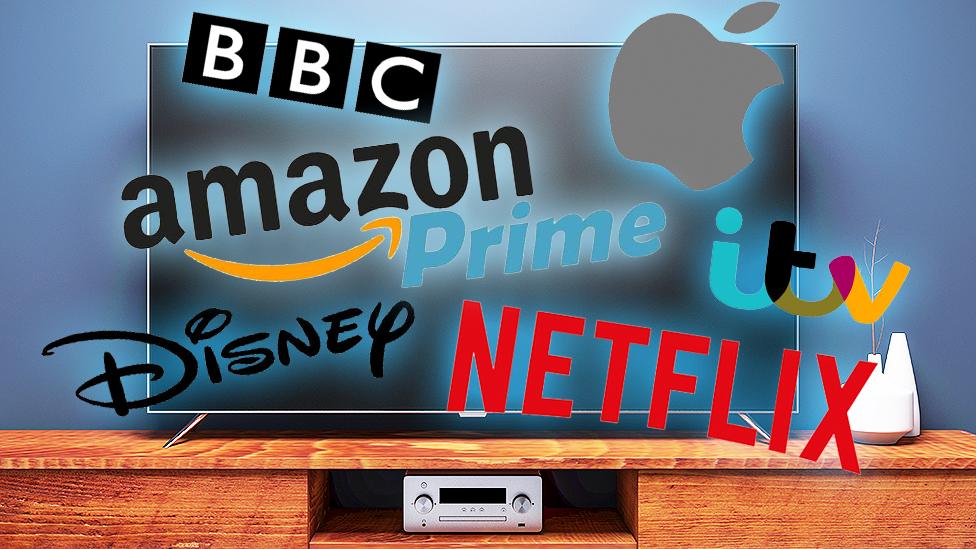
TV streaming "is about freedom more than anything else," says Mr Ward
As well as TV, music streaming services such as Spotify, Apple and Amazon Music revived the fortunes of the music industry in the 2010s.
For Aiden Hatfield, a professional musician and mental health advocate from Leeds, streaming means "it's a lot easier" for him to get people listening to his songs.
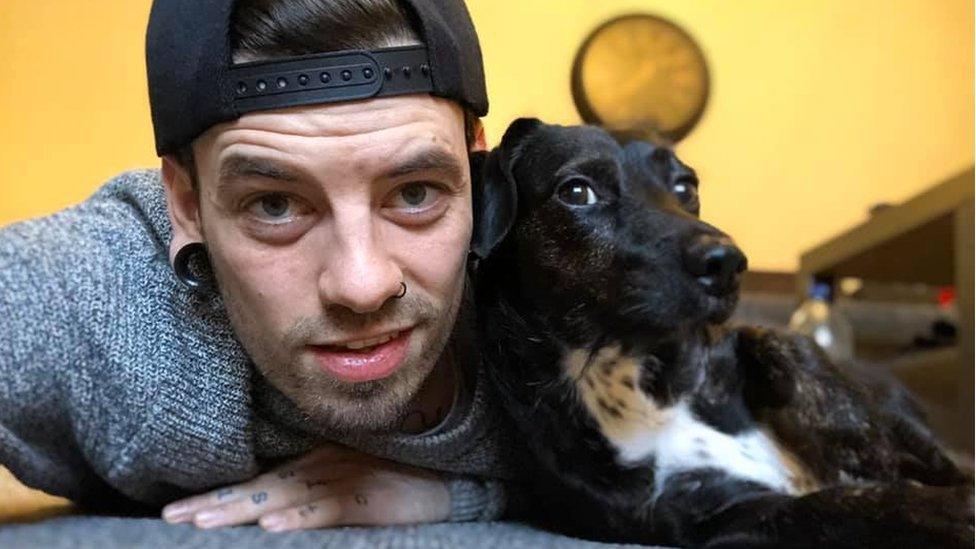
Putting music out "seems a lot easier" now, says Mr Hatfield - but on Spotify he only earns about $0.003 per stream
"You send them a link," he says. "They can have a listen without paying any more than they already do."
But Mr Hatfield, 31, adds: "Now that we are in the era of streaming it does mean there's a lot more artists out there because it's easier for people to get music online and the competition is harder."
Alongside their enormous music libraries, several streaming services create custom playlists of recommended songs, based on listeners' data and an algorithm.
"Sometimes a song will come on when I'm streaming and it will really hit me," says Mr Hatfield.
"The algorithm doesn't always work, but when it does it's a beautiful thing."
'I was able to marry'
The legalisation of same-sex marriage in England, Wales and Scotland in 2014 was a big moment for LGBTQ rights.
For Tamsin Omond, who campaigned for the law change, it means she can now marry her partner, Melissa MacDonald.
The couple exchanged vows at an Extinction Rebellion rally earlier this year but will marry in a legal ceremony in May.
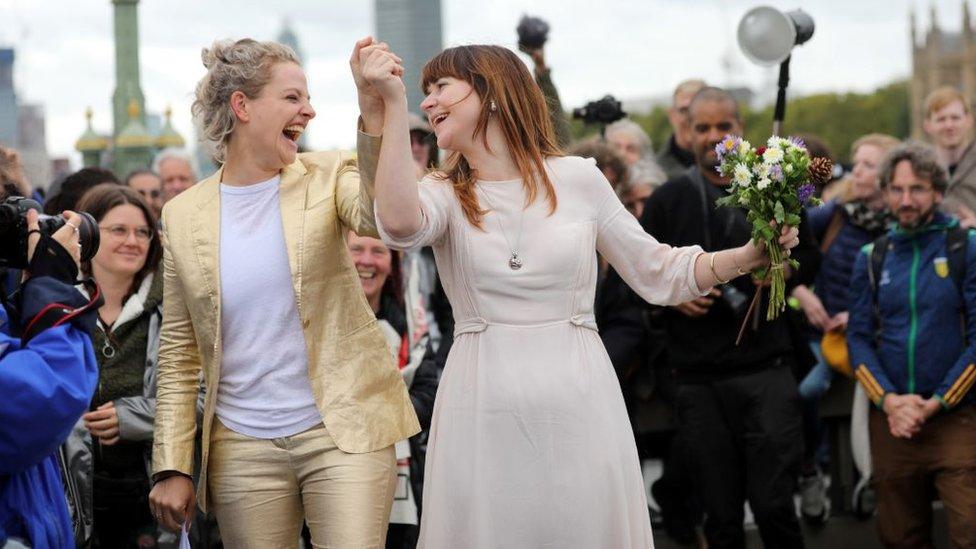
Tamsin, left, helped to organise a party outside Conservative Party HQ as part of the campaign to get David Cameron to back same-sex marriage
Tamsin, 34, says they saw the law change as a "step along the road to equality".
"How has it changed my life? It hasn't really," they say. "It's made me more thoughtful that the freedoms I can enjoy here aren't accessible to other people."
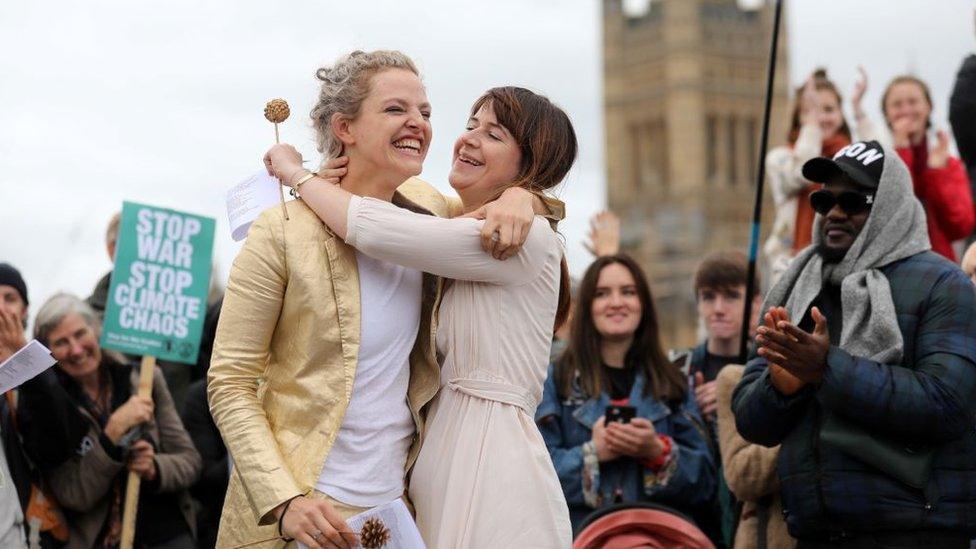
Tamsin says the moment the law change came in was a moment to celebrate amid a long struggle
Professor Jacqui Gabb from the Open University says research shows more young LGBTQ people are now thinking about whether they will have children in the future, as they grow up knowing they can get married.
"There is definitely an indication that there is a trend among LGBTQ couples which is almost a domestication," she adds, saying research shows there is a rise of dog ownership in LGBTQ communities.
Meanwhile, Dr Ryan-Flood suggests there has also been "a greater openness to experimenting" with other genders in the 2010s, alongside a rise of people embracing idea of the "post-heterosexual".
In general, the 2010s have seen "a stronger sense and awareness of diversity in mainstream media and culture," says cultural sociology professor Nick Prior.
"From Marvel characters to the MeToo movement, we've become much more conscious of the ethics of representation and why the visibility of previously marginalised populations such as BAME populations, LGBTQ+ communities and women, matters," he says - but adds "there has been a backlash too".
'I started a feminist movement'
In 2012, Laura Bates founded the Everyday Sexism Project,, external a website collecting women's daily experiences of gender inequality.
By the end of the following year, the site had 50,000 entries. Now, that number is into the hundreds of thousands.
The project has been used in schools to teach about sexual consent, helped retrain, external 2,000 police officers and led to a discussion, external at the UN.
"Looking back I think the sheer scale of the response, which I never dreamed of, proves three things: the absolutely massive scale of the problem; the extent to which it had previously been hidden and silenced; and the power of women's collective voice to create change," says Ms Bates.
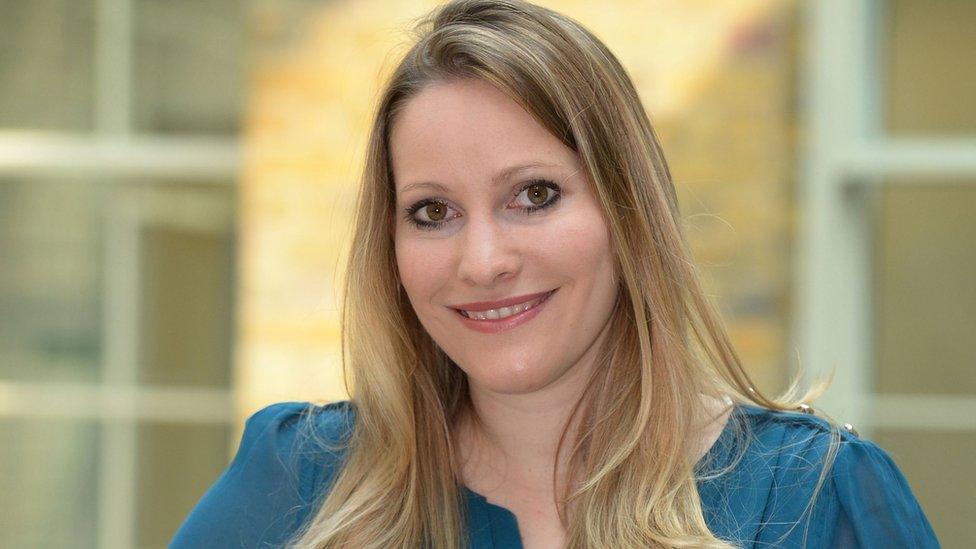
Laura Bates, who went on to write a book called Everyday Sexism, won a British Empire Medal in 2015
Five years later, the MeToo campaign against sexual harassment and abuse spread across the globe.
"I think both movements are part of a vital form of consciousness-raising that builds on the work and tradition of previous generations of feminists," she says, adding "they are proof of the power of collective voice".
But she adds: "I would caution against the instinct to point to Everyday Sexism or Me Too and say 'There, look, the problem is solved.'
"I think these have been vital movements with huge importance and power but they are the first step to solving the problem, not the solution."
Looking back, Ms Bates says she feels "extremely lucky" to be able to work in a field which she feels passionate about, but adds the level of abuse she receives - up to 200 death and rape threats a day - has had a "real impact" on her life.
"People often ask if I regret starting the project or think about stopping, but it doesn't feel like a choice: I don't think anybody would be able to consider stopping if they were reading the entries I receive every single day."
Laura Bates: "This is not a men versus women thing, its very much a universal project"
And she adds she feels strongly that the Everyday Sexism project "was never about me" - but "testament to the power of the hundreds of thousands of people who have raised their voices".

What might the 2020s bring?
Algorithms will get smarter at predicting and shaping cultural tastes, suggests Nick Prior, from the University of Edinburgh.
"But if the digital age has so far been one of excess, I think the next decade will be - and perhaps has to be - an age of restraint: a more circumspect engagement with data, greater sensitivity to how social media impacts negatively on mental health and contributes to environmental concerns."
He also predicts "a renewed belief in collectives and grassroots activities, a move away from online to hybrid spaces - festivals, meet-ups, community initiatives, choirs, and so on."
Academics say the biggest trend of the 2010s was the "rise of data".
"All the biggest companies in the world are underpinned by the value of their data," says sociology professor Dave Beer from the University of York.
"If you look at the big companies 10 years ago, they were underpinned by gas, oil or chemicals. So the capitalism has completely shifted."
Mr Prior says that if the 2000s were characterised by the boom in people expressing themselves online and creating their own content, he says, "that vision has now tipped into something more sinister in the social media age".
"The biggest and most powerful players on the planet are Facebook, Google, Apple and Amazon and their collective impact on what we consume, where, how and in what form has been deep and profound."
All images subject to copyright.

- Published5 October 2014
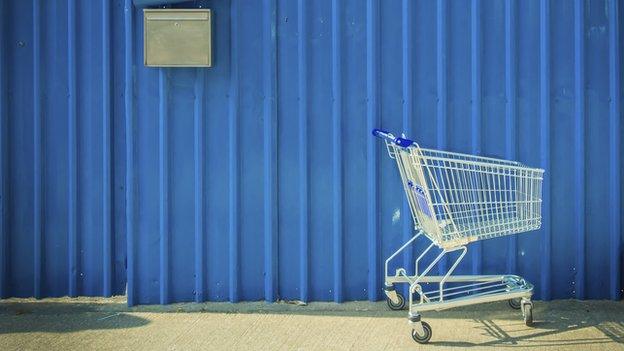
- Published3 December 2019
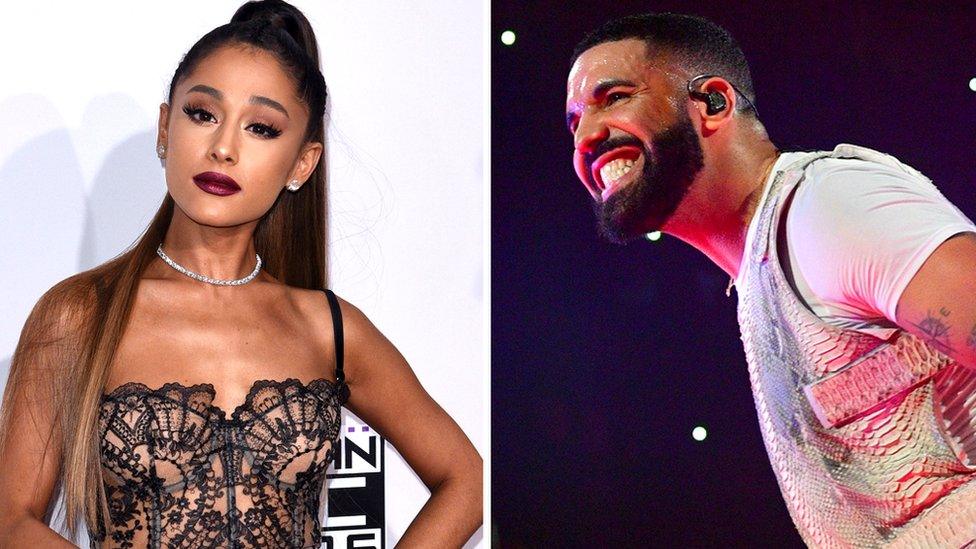
- Published12 April 2019
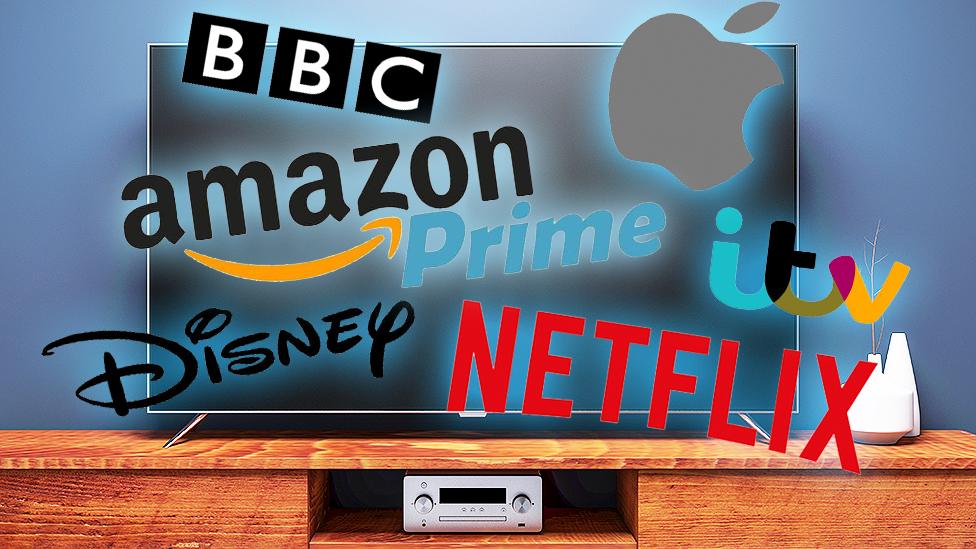
- Published1 March 2018